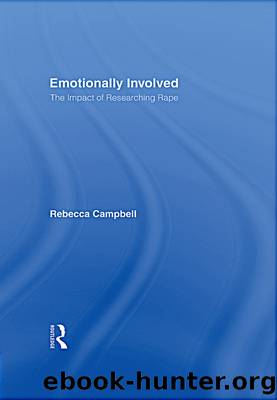Emotionally Involved by Campbell Rebecca;

Author:Campbell, Rebecca;
Language: eng
Format: epub
ISBN: 1222755
Publisher: Taylor & Francis Group
With respect to the job of researcher, the norm is not to express emotions. The feeling rules are that there are no feelings. The display rules are that no emotions are displayed. Therefore, to the extent to which such role-violating feelings develop, the researcher must find ways to cope or manage those feelings to make his or her internal and external states consistent with expectations.
In the context of our research interviewing rape survivors, emotion work theory provides a useful framework for understanding how we felt about feeling rape. In a word, conflicted. The feeling rules of science were deeply ingrained in all of us, even the undergraduate interviewers who had less time in the academy than other members of the research team. Yet feminist methodologists have explicitly challenged the feeling and display rules of research (see Bergen, 1993; Fonow & Cook, 1991; Mies, 1991; Oakley, 1988; Reinharz, 1992). The relationship between the researcher and the researched can be nonhierarchical, characterized by the sharing of information, resources, and experiencesâincluding emotions (see Jaggar, 1989; Oakley, 1988). Inspired by the writings of Raquel Bergen (1996), Ann Oakley (1988), and Shulamit Reinharz (1992), we tried to bring these ideas to life in our project. It can be done, but I was largely unprepared for what it would feel like to try to change such norms. What I discovered in this researching-the-researcher project is that the feminist methodology literature provides a template for change but little warning about what it might feel like to actually try to reconceptualize the research setting in this way. It felt very confusing. Even when deliberately and consciously trying to establish new feeling rules, there was a great deal of emotion work necessary to negotiate such conflict.
Although no one in the research team reported the emotional dissonance Hochschild describes (i.e., we could distinguish between what we thought we should feel and what we did feel), we engaged in emotion work before, during, and after the interviews we conducted with rape survivors. In preparing for an interview, we had to pull into ourselves, blocking out the rest of our lives (temporarily) so we could give a hundred percent of our attention to the rape survivor. Over time this became easier to do, and we needed less emotional setup time to get ready for an interview. Nevertheless, we had to manage the uneasiness of anticipated interviews.
It was during the actual interviews that our need to regulate our emotions was at its strongest. As feminist interviewers, we planned on engaging our participants, sharing information and feelings. We would not sit there showing nothing, revealing nothing. If we were upset, then our project's ethic dictated that we could show those feelings. But only to a point. The interview should always be about the victim; she is the focus, not us. To gauge what we should and should not reveal, I offered this guideline in training: if you think your reaction would prompt the survivor to stop talking about what happened to her so she could attune to your feelings, that's too much emotion revealed.
Download
This site does not store any files on its server. We only index and link to content provided by other sites. Please contact the content providers to delete copyright contents if any and email us, we'll remove relevant links or contents immediately.
Chaco's Northern Prodigies : Salmon, Aztec, and the Ascendancy of the Middle San Juan Region after AD 1100 by Paul F. Reed(338)
Law Enforcement Interpersonal Communication and Conflict Management by Brian Douglas Fitch(336)
Digital International Relations by Unknown(329)
Skilled interpersonal communication: Research, theory and practice, Fifth edition by Owen Hargie(316)
Critical Perspectives on Human Security : Rethinking Emancipation and Power in International Relations by David Chandler; Nik Hynek(316)
The Enduring Color Line in U.S. Athletics by Krystal Beamon Chris M. Messer(311)
Evidence-Based Policy Making in Labor Economics by Hamermesh Daniel S.;Nottmeyer Olga K.;Nottmeyer Olga;King Sarah;King Sarah;King Sarah;(280)
EPSO CAST Political affairs EU policies: How to succeed in the selection procedure by Franco Reverte José María(274)
Writing Public Policy - A Practical Guide to Communicating in the Policy Making Process by Catherine F. Smith(256)
Criminological Theory in Context by John Martyn Chamberlain(252)
Threshold Concepts in Women's and Gender Studies by Christie Launius Holly Hassel(250)
Tibeton Yoga Its Secret Doc by Evans-Wentz(249)
Positive Psychology and Spirituality in Counselling and Psychotherapy (Conflict, Ethics, and Spirituality, 12) by unknow(249)
Social Problems, Social Issues, Social Science by James Wright(246)
Rothschild and Early Jewish Colonization in Palestine (Geographical Perspectives on the Human Past) by Ran Aaronsohn(245)
Play in child development and psychotherapy: toward empirically supported practice by Sandra W. Russ(239)
Cognitive Development in Infancy and Childhood (Elements in Child Development) by Mary Gauvain(235)
Latin American Politics and Society by Gerardo L. Munck & Juan Pablo Luna(211)
What Makes a Social Crisis?: The Societalization of Social Problems by Jeffrey C. Alexander(209)
